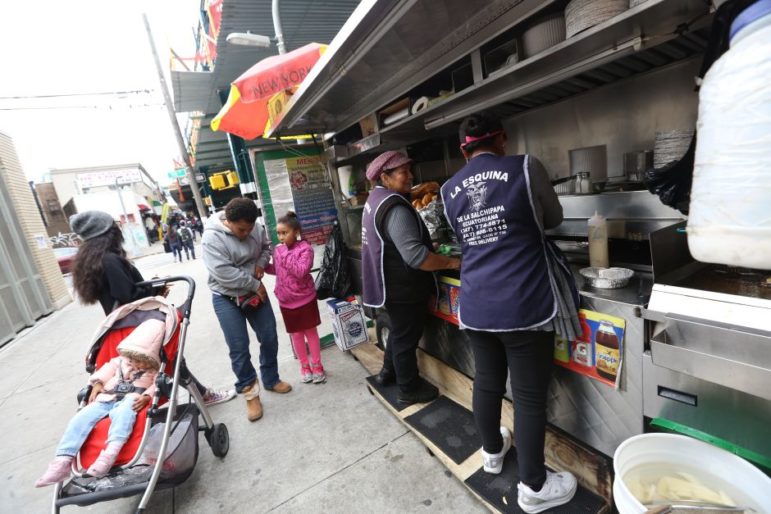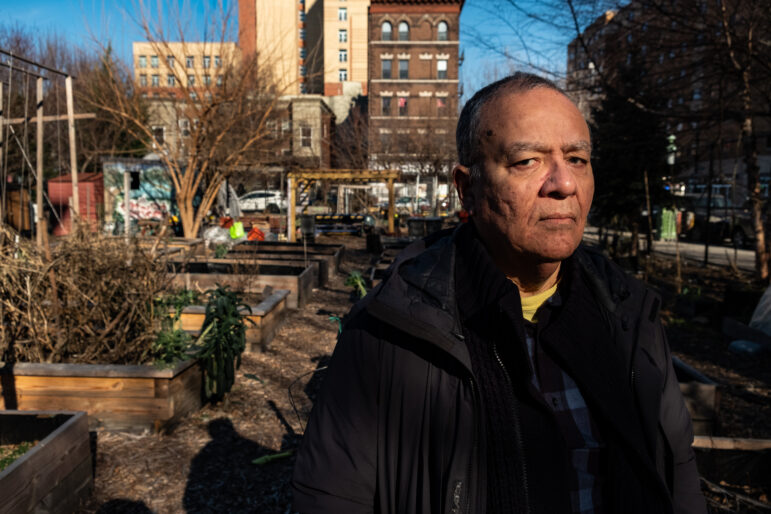
El Diario/Mariela Lombard
A street food vendor in Corona, Queens.
Read the original story in Spanish at El Diario/Lea la versión en español aquí
Translated and condensed by Carlos Rodríguez Martorell
For years, street merchants have complained about the city’s unwillingness to issue more street vending permits – which have been capped at set numbers since 1979 – claiming the failure to do so exposes hundreds of mostly immigrant workers to stiff fines for trying to earn a living without a proper license.
In the midst of the battle being waged by merchant associations and street vendor advocates, State Senator Jessica Ramos is promoting a bill that seeks to solve the problem by lifting the limits on the number of street vending permits currently in place for sidewalk commercial activities.

Voices of New York spotlights ethnic and community reporting from around the city. Click here to read more.
The legislation has the support of vendors like Benito Medias, who sells food out of a cart on Roosevelt Avenue in Corona. He describes the proposed law as a ray of hope. “It is something that needs to be done, because many fellow vendors who are out there working want to do things the right way, but there are no licenses.”
The Mexico native added that “it is a matter of justice for all, so that we can all pay what we are supposed to for the permits and be at ease.”
Mercedes, a worker at the “La Esquina de la Salchipapa” food cart in Corona, agrees, pointing at the high sums that unlicensed vendors are forced to cough up to rent a coveted permit.
“That is the hardest part of it all: Having to pay over $20,000 every year just because they do not want to give us a permit, which we evidently need because there are already many merchants on the street offering a service to the community,” said the Ecuadoran-born vendor.
While Ramos’ bill has the street merchants’ support, it faces opposition on the part of brick-and-mortar business owners who claim that their own sales would be affected. They see street vendors as competition, and say that they promote overcrowding in the streets.
Matthew Shapiro, legal director of the Street Vendor Project, backed the initiative and asked Albany and the city to expedite the bill.
“It is about providing economic opportunities for the smaller businesses in our city and the most vulnerable New Yorkers,” said the activist. “Street vending has been a means to starting a small business without the need for the capital to build a brick-and-mortar store. The city and the state should be promoting this.”
According to the Street Vendor Project, which has been fighting for a lift of the permits cap for years, there are some 20,000 street vendors selling food and other goods in New York City, and issuing new permits would represent a relief for these workers. The non-profit rejects the argument that street vendors’ work affects brick-and-mortar businesses.
Ramos’ initiative guarantees that municipalities would be the ones to decide the areas where street vendors would be allowed to operate.
“The idea is to decriminalize street vending and remove restrictions, so that every vendor goes through the appropriate inspections,” said Ramos, explaining that the goal is to attain a balance between the people making a living selling goods in the street and the businesses asking for consistency in regulations. She also asserts that her bill would create a source of income and tax revenue for cities.
Mayor Bill de Blasio, though, has expressed opposition to the legislation.
“I would argue that a lifting of the cap is not the way to go and that we need a much stricter application system. We know that there is a black market among current permit providers, and that is a problem. There is a lot wrong with the current system, and I think that opening it up to anyone and everyone is not useful,” he said.
De Blasio, whom many street vendors have accused leaving informal businesses like theirs in limbo, said that another problem with Ramos’ proposal has to do with pedestrian circulation on the sidewalks.
“Our sidewalks are clogged in a lot of places. I am particularly concerned about our traditional brick-and-mortar small businesses, who have been struggling a lot, especially with the internet commerce reality. So, no, I would not make it an open situation,” said the mayor.
For his part, City Council Speaker Corey Johnson disagrees with the elimination of the cap but believes that increasing the number of new permits issued is urgent.








